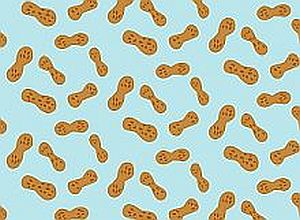While 93% of US paediatricians surveyed were aware of the national guidelines on peanut allergy prevention in infants, only 30% were fully implementing the recommended practices and 64% reported partial implementation, according to a study by researchers Northwestern University Feinberg School of Medicine, Chicago, Ann and Robert H Lurie Children’s Hospital, Chicago, Rho Federal Systems Division Inc, Durham, North Carolina and the National Institute of Allergy and Infectious Diseases, Bethesda, Maryland. The guidelines issued in 2017 call for assessment of peanut-allergy risk and introduction of peanut-containing foods in the diet of infants at 4-6 months of age, in efforts to prevent peanut allergy. This is a reversal from 20 years ago, when the American Academy of Paediatrics recommended that peanut should be avoided until the child is 3 years old.
“Our study is the first population-based survey of a large nationwide sample of US paediatricians that characterises the current practices and barriers associated with the 2017 guidelines for preventing peanut allergy through early introduction of peanut-containing food in the infant’s diet,” says lead author Dr Ruchi Gupta, paediatrician and food allergy researcher at Ann & Robert H Lurie Children’s Hospital of Chicago, professor of paediatrics (Academic General Paediatrics and Primary Care) and medicine (Allergy and Immunology), and director of the US Centre for Food Allergy and Asthma Research at Northwestern University Feinberg School of Medicine. “We found that nearly 70% of paediatricians reported needing additional guideline training. Barriers to implementation are important to address since paediatricians, beginning with the 4-6-month well-child visits, can have a vital role in the reduction of peanut allergy.”
Peanut allergy is the most common paediatric food allergy affecting 2.2% of US children. It is the food allergy least frequently outgrown and is often associated with severe reactions. The 2017 guidelines from the National Institute of Allergy and Infectious Diseases (NIAID) are based on evidence that early introduction of peanut-containing food to infants significantly reduces peanut allergy prevalence.
The survey data included responses from 1,781 paediatricians. Gupta and colleagues found that common barriers to guideline implementation included lack of clinic time, conducting in-office supervised feeding of peanut-containing food, performing peanut allergy testing, concerns about newness of the guidelines, and parental fear of allergic reactions. Responding paediatricians also indicated the need for handouts for families explaining the guidelines on early peanut introduction to infants, as well as prompts in the electronic health record.
“We need further research on forms of training and types of practice aids that are necessary to increase guideline implementation,” says Gupta.
This study was funded by the National Institute of Allergy and Infectious Diseases (NIAID), part of the National Institute of Health (NIH).
Abstract
Importance: The 2017 Addendum Guidelines for the Prevention of Peanut Allergy in the United States recommend that pediatricians assess infant peanut allergy risk and introduce peanut in the diet at age 4 to 6 months. Early introduction has the potential to prevent peanut allergy development.
Objectives: To measure the rates of guideline awareness and implementation and to identify barriers to and factors associated with implementation among US pediatricians.
Design, Setting, and Participants: This population-based study survey used a 29-item electronic survey instrument that was administered to pediatricians practicing across the United States from June 1, 2018, to December 1, 2018. Invitations to complete a survey were emailed to all pediatricians in the American Academy of Pediatrics vendor database. Eligible participants were nonretired US-based pediatricians providing general care to infants aged 12 months or younger.
Main Outcomes and Measures: The primary outcome was the prevalence of guideline implementation, which was measured by 1 survey item about awareness followed by a second item about implementation. Secondary outcomes included identification of guidelines-focused services provided by pediatricians, knowledge of the guidelines (measured with 3 clinical scenarios), barriers to guideline implementation, need for training, and facilitators of guideline implementation.
Results: A total of 1781 pediatricians were eligible to participate and completed the entire survey. Most respondents self-identified as white (1287 [72.5%]) and female (1210 [67.4%]) individuals. Overall, 1725 (93.4%; 95% CI, 92.2%-94.5%) pediatricians reported being aware of the guidelines. Of those pediatricians who had knowledge of the guidelines, 497 (28.9%; 95% CI, 26.8%-31.1%) reported full implementation and 1105 (64.3%; 95% CI, 62.0%-66.6%) reported partial implementation. Common barriers to implementation included parental concerns about allergic reactions (reported by 575 respondents [36.6%; 95% CI, 34.3%-39.1%]), uncertainty in understanding and correctly applying the guidelines (reported by 521 respondents [33.2%; 95% CI, 30.9%-35.6%]), and conducting in-office supervised feedings (reported by 509 respondents [32.4%; 95% CI, 30.1%-34.8%]). Many pediatricians (1175 [68.4%; 95% CI, 66.1%-70.5%]) reported a need for further training on the guidelines.
Conclusions and Relevance: This survey found that most pediatrician respondents appeared to know of the 2017 guidelines, but less than one-third of respondents reported full implementation. Results of this study may inform future efforts to eliminate barriers to guideline implementation and adherence, thereby reducing the incidence of peanut allergy in infants.
Authors
Ruchi S Gupta; Lucy A Bilaver; Jacqueline L Johnson; Jack W Hu: Jialing Jiang; Alexandria Bozen; Jennifer Martin; Jamie Reese; Susan F Cooper; Matthew M Davis; Alkis Togias; Samuel J Arbes Jr
[link url="https://www.luriechildrens.org/en/news-stories/approximately-a-third-of-pediatricians-fully-follow-guidelines-on-peanut-allergy-prevention-in-infants/"]Ann & Robert H Lurie Children’s Hospital of Chicago material[/link]
[link url="https://jamanetwork.com/journals/jamanetworkopen/fullarticle/2768599?resultClick=3"]JAMA Network Open abstract[/link]

